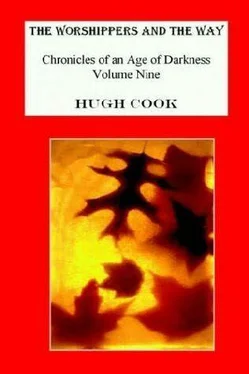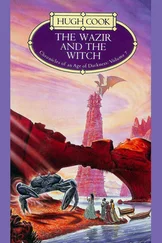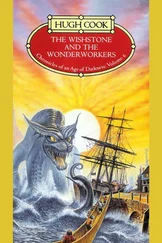Hugh Cook - The Worshippers and the Way
Здесь есть возможность читать онлайн «Hugh Cook - The Worshippers and the Way» весь текст электронной книги совершенно бесплатно (целиком полную версию без сокращений). В некоторых случаях можно слушать аудио, скачать через торрент в формате fb2 и присутствует краткое содержание. Жанр: Фэнтези, на английском языке. Описание произведения, (предисловие) а так же отзывы посетителей доступны на портале библиотеки ЛибКат.
- Название:The Worshippers and the Way
- Автор:
- Жанр:
- Год:неизвестен
- ISBN:нет данных
- Рейтинг книги:4 / 5. Голосов: 1
-
Избранное:Добавить в избранное
- Отзывы:
-
Ваша оценка:
- 80
- 1
- 2
- 3
- 4
- 5
The Worshippers and the Way: краткое содержание, описание и аннотация
Предлагаем к чтению аннотацию, описание, краткое содержание или предисловие (зависит от того, что написал сам автор книги «The Worshippers and the Way»). Если вы не нашли необходимую информацию о книге — напишите в комментариях, мы постараемся отыскать её.
The Worshippers and the Way — читать онлайн бесплатно полную книгу (весь текст) целиком
Ниже представлен текст книги, разбитый по страницам. Система сохранения места последней прочитанной страницы, позволяет с удобством читать онлайн бесплатно книгу «The Worshippers and the Way», без необходимости каждый раз заново искать на чём Вы остановились. Поставьте закладку, и сможете в любой момент перейти на страницу, на которой закончили чтение.
Интервал:
Закладка:
His anger eased.
"Is my brother a coward?" said Oboro Bakendra.
"Tell him your challenge," said Hatch, realizing that mere surrender was not going to get him out of this in one piece. "Tell him your challenge, then you will know him in his nature."
"The challenge is this," said Oboro Bakendra. "You will call your dog to heel. Or else!"
"My dog?" said Hatch.
What was the man riddling about?
Hatch presumed that no actual member of the canine tribe was being referred to, for certainly (it has been stated once above, and let it be stated her a second time in confirmation of the proof of the fact) he owned none such. In fact, his entire household was dog-free but for the mutt which his daughter Onica had got from the Lady Murasaki, and that small and tender animal had never been any trouble to anyone. But after all literal dogs had been examined and discounted, Hatch still had no idea what his dear brother Oboro Bakendra might be referring to.
"Your dog Gezira!" said Oboro Bakendra.
"Son'sholoma?" said Hatch.
"The same," said Oboro Bakendra. "He's been preaching the Nexus, preaching the Nu. Borboth, Borboth, Motsu Kazuka. Bring him to heel, Hatch! It's blasphemy, and it's your dog which speaks it."
"That reckless apostate fool is no dog of mine, nor cat neither," said Hatch. "Still, I've already called him to order as best I can, and there's an end to it."
"Oh no, oh no," said Oboro Bakendra. "He's on the loose, not him but six of them, this Nu, this chala, and all from your thesis. He told me! The blasphemy of gods, you wrote it down. They say – "
"I know what they say," said Hatch. "Or can guess."
"Then do something about it!"
"What can I do?" said Hatch. "I am but the emperor's slave.
It's not for me to give law in Dalar ken Halvar, not to Son'sholoma, no, nor to any other. I'm a slave, even as you are.
What I can do, you can do."
"I've not been within knifestrike of the emperor since my father's funeral," said Oboro Bakendra. "Nor am I likely to be within this month or next. I've not set foot on Cap Ogo Boch for months, whereas you – you're in and out of Na Sashimoko as if it were your second home."
"If I'm diligent in service," said Hatch, "then what of it?
Naturally I'm in and out of the imperial palace. On occasion. But so what? Does that make me rich? Powerful? I doubt either. If visiting palaces brings power, then the man who daily searches the nightsoil from Na Sashimoko should be emperor himself by now! But for all the wealth of his buckets he's nothing, and I likewise."
"Don't lie to me!" said Oboro Bakendra, thumping his fist on a lacquerwork table.
Hatch took a half-step back. Since his earliest youth, he had ever feared his elder brother's temper. And certainly Oboro Bakendra had cause to be angry, for Hatch had certainly been lying. While it was most doubtful that the Silver Emperor would do so much as raise his little finger to help sort out religious disputes on the Frangoni rock, he would still in all probability give Hatch an authorization to resolve this little religious uprising as he saw fit.
Which would mean that Hatch would be free to discretely murder the apostate Son'sholoma Gezira and his followers at a time and place of his choosing. But frankly – "Frankly," said Hatch, "I've no more belly for blood."
"You bitched your sister's husband good and quick," said Oboro Bakendra. "Why not Gezira, then? He's a fighter, perhaps?
Is that it? Is that your nature, Hatch? A killer of the unkilling, a coward in the face of killers – that's you. If it's fear, well, we'll give you something else to fear if you – "
"Brother," said Hatch, again with the grace of a woman, "brother, you came for the family good, for the good of the tribe.
Whatever speaks, it speaks for the good which you sought. Speak, that I may know your wish, that I may know your will."
"You're in a very ready mood today," said Oboro Bakendra, who was searching for a fight rather than for reconciliation.
"I have been too long away from my family," said Hatch, lapsing into ritualistic formality. "I have been feeling my want."
"So," said Oboro Bakendra. He clicked his tongue, and his hand went tap-slap-tap against his thigh – both gestures to which he habitually resorted to in moments of indecision, though Hatch doubted that he was aware of his own mannerisms. "So," said Oboro Bakendra. "So. You take instruction, do you?"
Now Hatch was calm. He had lived through his anger, had accepted that anger, and had dissipated it. In the aftermath of his anger, he felt as if he was floating. He felt very calm. Very clear. He thought for a moment to say: I am yours to command. Then checked himself. That was something a citizen of the Nexus might say, but this was not the Nexus. This was Dalar ken Halvar, and Oboro Bakendra was of the Frangoni rock.
Hatch could simply surrender to Oboro Bakendra and agree to everything Oboro said, but Oboro might think such surrender insincere, or a proof of cowardice. So Hatch decided to again invoke the Frangoni family, the Frangoni blood, the Frangoni nation – and attempt to surrender to that.
"You are ever the eldest," said Hatch. "So the family has been much your concern. Still, as I am grown to a man's estate, it is fitting that I too should meet the concerns of the family."
"You say," said Oboro Bakendra.
Oboro Bakendra was reluctant to concede a truce. Hatch knew what the problem was. The anticipation of conflict is so stressful that one's every resource goes toward gearing for battle. This is why it is very, very difficult to argue an angry man out of his rage: because his rage demands all his resources, and there is no part of him free to consider the possibility of conciliation.
"I was born to the blood," said Hatch. "Can I unblood myself, unbirth myself, or make myself unmothered? This is my sister's house, my brother's shadow. I am of the family, and you speak for the family."
"This I should have heard earlier," said Oboro Bakendra.
And Hatch knew that he had won, or at least was starting to win. This crisis could still end in violence, but Hatch believed he had almost defused it.
In argument, the natural temptation was always to justify oneself, and the need for self-justification was so much a part of Frangoni culture that it sometimes outranked the organic imperatives of physical survival. But in a yes-no conflict, to justify oneself was necessarily to unjustify one's opponent.
Hatch had found a third way, yielding to the higher good of the Frangoni family, and leaving his own dignity at least partially intact both in his own eyes and those of his brother.
As Asodo Hatch and Oboro Bakendra Hatch confronted each other, the pair of them almost but not quite having reached the stage of reconciliation, they heard a voice outside.
"Hatch!" said the voice. "Asodo Hatch! Are you in there?"
Hatch knew that voice. It was Lupus Lon Oliver, the brightsharp Free Corps warrior who would shortly be fighting him for the Combat College's instructorship – unless they could make alternative arrangements for the disposition of the job.
"I'm in here," said Hatch.
"Then come out! Or may I come in? I need to talk to you. I need to talk to you about Gezira, Son'sholoma Gezira."
Hatch looked at Oboro Bakendra, who said, roughly:
"Go to him, then. You see? I'm not alone in thinking your dog needs a beating!"
So Hatch went outside to meet with Lupus Lon Oliver, wondering exactly how much trouble Son'sholoma had managed to cause by his blasphemous preachings, and wondering yet again whether he would truly be forced to kill Son'sholoma before this thing was through.
Chapter Eight
Free Corps: an association of Combat College graduates and their ideological allies. It is currently governed by Manfred Gan Oliver, who has his headquarters in the Brick, a building located on the southern side of Zambuk Street in the gap between Cap Foz Para Lash and Cap Uba. The Free Corps is dominated by Ebrell Islanders.
Читать дальшеИнтервал:
Закладка:
Похожие книги на «The Worshippers and the Way»
Представляем Вашему вниманию похожие книги на «The Worshippers and the Way» списком для выбора. Мы отобрали схожую по названию и смыслу литературу в надежде предоставить читателям больше вариантов отыскать новые, интересные, ещё непрочитанные произведения.
Обсуждение, отзывы о книге «The Worshippers and the Way» и просто собственные мнения читателей. Оставьте ваши комментарии, напишите, что Вы думаете о произведении, его смысле или главных героях. Укажите что конкретно понравилось, а что нет, и почему Вы так считаете.












